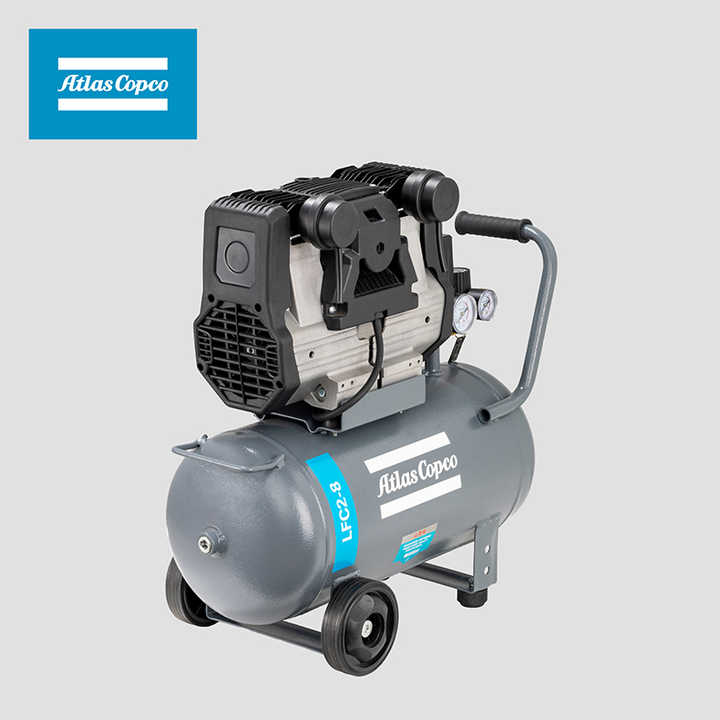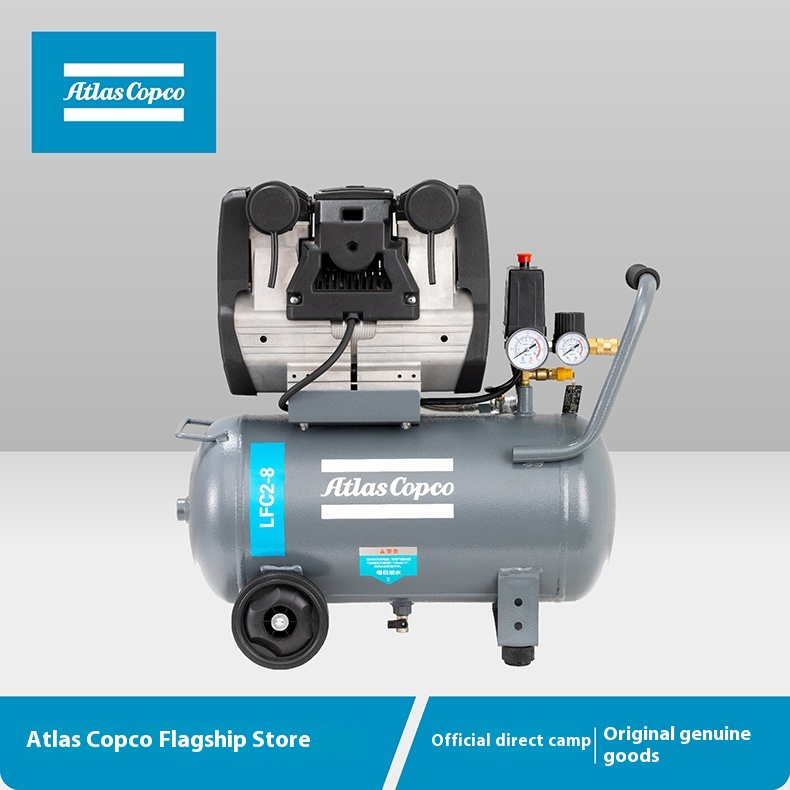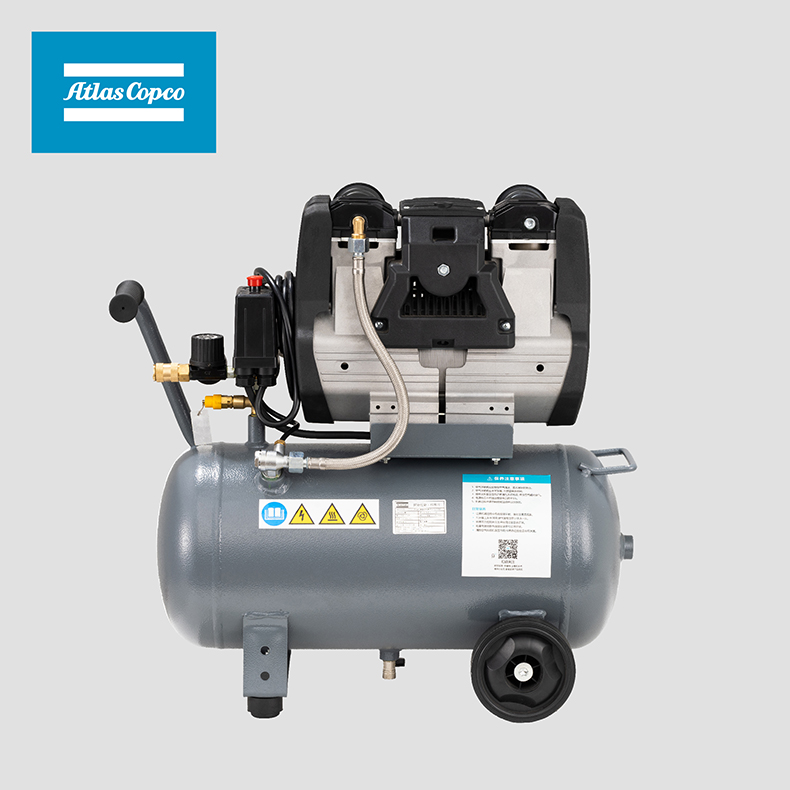Atlas Copco LFC2-8 100% Oil Free Air Compressor with Atlas Copco F6 Dryer & Inline filters to meet medical grade. Pre & Post filters
659mm L x 300mm W x 593mm H
2HP / 1.5kW
95 L/Min / 1.58 L/S / 3.35 cfm @ 8 Bar
24L Tank
7 AMPS
1430 RPM direct
Dental compressor: in particular, the dental air needs to be hygienic and should meet the requirements in terms of air quality that are set out in ISO 22052. Your compressor should be certified as a class II a medical device.
In essence, dental air compressors in Australia must be designed and operated to deliver clean, dry, and regulated air to dental equipment, ensuring patient safety and hygiene. Contact us to add dryers and inline filtration required with this compressor to meet the required standard.
-
ISO 22052:2020:
Defines standards for dentistry plant area equipment, including compressor systems.
-
ISO 8573-1:
Specifies that dental air produced by the compressor should conform to purity class 2:4:2.- Particle Class 2: Limits the number of particles in the air to 100/m³.
- Humidity Class 4: Requires a specific humidity level to prevent condensation.
- Oil Content Class 2: Limits the oil content to 0.1 mg/m³.

Key Regulations and Standards:
-
Class IIa Medical Device Certification:
-
Compressors should be certified as Class IIa medical devices to ensure they meet safety and hygiene requirements.
Importance of Oil-Free Compressors:
-
Hygiene:
Oil-free compressors are preferred to prevent oil from contaminating the compressed air and potentially entering the patient's mouth.
-
Equipment Maintenance:
Moisture in the compressed air can cause corrosion of dental equipment, so oil-free compressors often include drying systems to remove moisture.
-
Patient Safety:
Ensuring the air is free from contaminants like oil and bacteria is crucial for patient safety during dental procedures.
Other Considerations:
-
Proper Installation:
Compressors should be installed according to manufacturer instructions and local regulations.
-
Maintenance:
Regular maintenance, including filter changes, is necessary to ensure the compressor continues to produce high-quality compressed air.
-
Noise Minimization:
Dental practices may need to consider noise reduction measures for compressors, as they can be a source of noise in the practice.
-
Location:
The location of the compressor within the practice should be carefully considered to ensure efficient air delivery and minimize noise.


Oil contamination from the compressor
The possibility of oil contamination from the compressor is generally considered very late during trouble shooting, or completely missed. This is because dental plant equipment, namely the dental compressor, is usually out of sight, out of mind to the end user. The use of oil-free compressors will prevent oil contamination to provide continuous and pure compressed air in line with ISO22052:2020.
Understanding ISO22052:2020
To understand the importance of oil-free air in dentistry it is critical to understand ISO 22052:2020 which is the international standard the defines dentistry plant area equipment: compressor systems. There are four ways in which we define air quality. Each is important to providing high-quality air to dental treatment rooms.
The ISO 22052:2020 defines standards for dentistry plant area equipment: Compressor Systems. Within this standard it references ISO8573-1 which defines that dental air produced by the dental compressor shall conform to purity class 2:4:2.
Particle Class 2: Number of particles in the air with a size between 1µm and 5µm in dental air is ≤ 100/m3. Cattani compressors exceed this Class 2 requirement and satisfy Class 1 for solid particulate, thanks to the HEPA H14 filter on top of the drying column. The bacterial filter removes 99.975% of 0.3 micron or larger particles.
Humidity Class 4: Cattani compressors meet this standard using a drying system. Air output is a constant humidity level that will not condense fluid in the oral cavity. Cattani also offers an optional pre-filter accessory to cater to humid environments.
Oil Content Class 2: Oil content of the dental air is ≤ 0.1 mg/m3. Cattani compressors do not rely on oil for lubrication of moving parts. They do not contain any oil in the piston and cylinder assemblies which can affect air quality.
Dental air compressors that meet or exceed this international standard go a long way towards the success of composite bonding.
Oil-free dental compressors for composite bonding
Regardless of the number of layers in a filtration system, there is but one satisfactory outcome in this scenario – successful composite bonding. This can be accomplished with the help of oil-free compressed air delivered through a multilayer antibacterial filtration system.
Quality and precision are what we pride ourselves in after more than 50 years of specialising in premium air technology. Our antibacterial HEPA H14 filter (High-Efficiency Particulate Air), comes standard with all dental compressors and helps deliver quality results by removing 99.975% of solid and biological particles down to 0.3 micron.
The ultimate guide to choosing the right dental air compressor
Dental practices rely on air compressors to power the handheld tools that clean and treat their patients’ teeth. They’re an integral part of every modern dental surgery.
However, buying a new compressor can be a significant investment, so it’s essential that you choose a suitable compressor for your practice. In this guide, we’ll cover everything you need to know about selecting a quality dental compressor.
What is a dental air compressor?
Compressors in dental clinics are used to power dentists’ tools. These handheld tools require a continuous flow of high-quality, clean air to run effectively and clean patients’ teeth. Dental compressors provide this flow of air, as well as cleaning, drying and storing the air for dentists to use when needed.
Unlike other industries, dental tools require clean, almost medical-grade air to treat patients’ teeth. Dental compressors lower the dew point of the compressed air and remove impurities and moisture to ensure the air is dry, clean and free from potentially harmful bacteria.
How to choose a suitable dental compressor
When selecting the right compressor for your dental practice, there are a few factors you should consider. These are:
- Oil
- Size
- Noise level
- Pressure
Oil
Practices choose oil-free compressors for dental use because these ensure that the air is clean and oil-free. The use of compressed air in dental practices is strictly regulated for patient safety, and the machines must meet high hygiene standards. These regulations ensure that patients aren’t exposed to oil, bacteria or other contaminants.
As a dental practice, you should be aware of the regulations governing the use of compressed air. Dental Compressor Regulation outlines the type of compressors allowed in dental practices. Compressed air should be from an oil-free dental compressor with an integral dryer, an internally coated air receiver and a breathing air and bacterial filter.
For more advice on choosing a quality oil-free compressor, contact us
Size
Another important factor you’ll need to consider is the size of your compressor to ensure that it’ll meet the needs of your dental practice. A compressor system that is the correct size for your needs will be more efficient and reliable. Overworked compressors could result in lower-quality air that is not as dry as it should be, negatively impacting patient safety.
To work out the size of the compressor you’ll need, you should consider how many operators will need the compressor at one time. Capacity refers to the output in litres per minute (LPM), and each dental chair will require around 50 LPM (or 2 CFM of air).
Noise Level
Air compressors are typically very noisy machines, which can prove problematic when used in small spaces. This is especially a problem in dental offices where dentists must work in close proximity to the machines. So, many dentists choose silent air compressors to enhance patient comfort.
Most silent compressors operate at around 60-70 decibels. However, you can also use an acoustic hood, enclosure, or cabinet to reduce noise further and minimise disruption to your practice.
Pressure
You should also consider the pressure requirements of your dental tools and the compressor’s maximum working pressure. Different tools will have different pressure requirements, often measured in bars (1 bar equals 14.5 PSI).
The majority of dental equipment requires a pressure of 5 bars, but some can require a pressure of 10 bars. However, choosing a compressor that generates slightly more pressure than your surgery requires is best to ensure you don’t overwork your machine. This will give you peace of mind about your compressor’s performance and reliability.
Silent and oil-free air compressors for sale
If you’re looking to purchase your first dental compressor, then Air Supply can help!
We have a wide range of quality new compressors, including silent and oil-free compressors, which are ideal for use in dental practices. All our air equipment, air dryers, receivers and compressors are selected from the best models available on the market. This ensures you get quality machines with the highest technical specifications at competitive prices!
| SKU | LFC2-8-F6-FILS |
| Brand | Atlas Copco |
| Shipping Weight | 35.0000kg |
| Shipping Width | 0.600m |
| Shipping Height | 0.600m |
| Shipping Length | 0.300m |
| Shipping Cubic | 0.108000000m3 |
Be The First To Review This Product!
Help other Screw Compressor Spares users shop smarter by writing reviews for products you have purchased.





